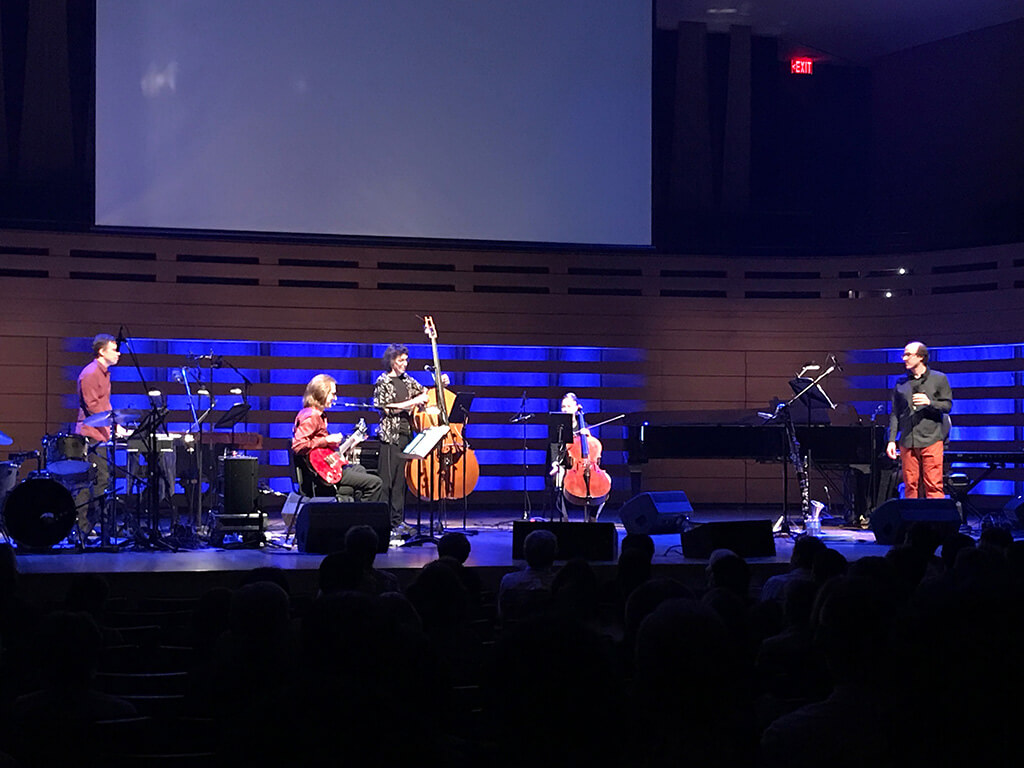
21C Music Festival: Bang on a Can All-Stars. Koerner Hall Saturday, May 27
For those who appreciate music by living composers, you’ll know how important Bang on a Can All-Stars are. After 25 years of rocking the boat, the amplified touring arm of Bang on a Can have somehow entered the establishment — second only to the Kronos Quartet as ambassadors for contemporary chamber music in the U.S.
They have become a brand unto themselves. Backed by the vision of bon vivant founders Michael Gordon, David Lang, and Julia Wolfe, they have represented the formalisation of the New York City Downtown sound. An arm that reaches out to answer the questions asked by post-minimalist forefathers such as Steve Reich and Philip Glass. Beethoven is dead, I’m not. Hear me roar.
Koerner Hall was filled to about 75% capacity with the usual suspects for 21C — adventurous ears from all walks of life eager to hear what BOAC have been up since last appearing in Toronto in 2012.
The premise of the program was simple: “Field Notes”, a series of pieces inspired by found audio and video. What was apparent was the incredible variety of approaches by each of the composers: Julia Wolfe, Michael Gordon, David Lang, René Lussier, John Oswald, Allison Cameron, Caroline Shaw, Steve Reich, and Anne Clyne, as well as some younger voices Eliot Britton and Richard Reed Parry.
The single world-premiere on the program was by Toronto’s John Oswald, “Fee Fie Foe Fum”. It was a fascinating return to plunderphonics, a method of composition he pioneered forty years ago. The piece itself was a nostalgic romp through a 1966 hit ‘Get Ready” by the Temptations. Can we all agree that Oswald is a national treasure?
René Lussier’s nasal cavity flapping “Nocturne” was based on a secret recording of the composer’s wife snoring. Clarinettist Ken Thomson provided the exhale, while Guitarist Derek Johnson and Bassist Robert Black provided the inhale. The work was ingenious from the get-go and had the audience laughing along. (Leave it to a composer to think of making a piece out of his wife snoring – the poor woman must have been mortified.)
Christian Marclay’s “Fade to Slide” was a sophisticated collage of clips pieced together from films — rapidly cut shots of actors playing instruments, dancing, smoking, water freezing, canons firing — all stitched together into a bewildering deluge. The BOCA played a highly synchronised score to the film, and the meaning between them overlapped. For example, when a clip of Tippi Hedren from Alfred Hitchcock’s “The Birds” plays the piano, so did Vicky Chow over top of it. When a shot of carrots were being chopped, the percussionist tapped along on his snare drum.
Julia Wolfe’s “Reeling”, which took a found audio recording of a French Canadian singer Benoit Benoit, turned into a hard stomping treble reel. Michael Gordon’s pulsing”Gene Takes a Drink” was the most minimalist of the bunch and was set to a POV video shot by his dog in a community garden. BOAC percussionist David Cossin was the odd man out in David Lang’s “Unused Swan”. He grappled with a six-foot steel chain inside a metal bin, while the rest of the ensemble played a dirge that pressed the point.
Anna Clyne’s “A Wonderful Day” was based on a recording of a Chicago street performer singing a moody tune. Reminiscent of Gavin Bryars’ Jesus Blood Has Never Failed Me Yet, it held it’s own.
“The Brief and Neverending Blur” by budding composer Richard Reed Perry (also a member of the Arcade Fire) took things further by utilising stethoscopes as a kind of heartbeat metronome. The short piece had a surprisingly fluid momentum and like the discovery of an unexpected moment, it was a gentle calm to the otherwise swashbuckling program.
Eliot Britton’s “Cuneiform and Glide” (first movement) offered a shifting pallet of sound that gradually morphed from a hazy granular texture into a full-on EDM beat backed by Vancouver-born pianist and BOAC member Vicky Chow, who somehow managed to sound more exact than the recording.
Allison Cameron’s “In 3rds, 4ths & 5ths”, a clear favourite, was the most charming of the program and radiated with warmth. It had BOAC members doing double duty on harmonicas while they played their regular instruments.
“Really Craft When You” by 2013 Pulitzer Prize winner Caroline Shaw was the only disappointment of the night. Despite a compelling text from 1970s North Carolina of Quilters talking about their work, the piece begged for more. A key change being one of them.

After all this activity, BOAC shows no sign of slowing down. Sure, they may have mellowed since being cast as a dangerous gang of downtown classical music thugs, but they are still up for anything. Most importantly, they stand out against the traditionalists who have long since kicked away the ladder from any new entries to the classical cannon.
As David Lang wrote in their program, “Bang on a can has had a long and fruitful relationship with Canada and Canadians and we intend to keep it going.” Let’s hope so.
For more REVIEWS, click HERE.
#LUDWIGVAN
- THE SCOOP | Royal Conservatory’s Dr. Peter Simon Awarded The Order Of Ontario - January 2, 2024
- THE SCOOP | Order of Canada Appointees Announced, Including Big Names From The Arts - December 29, 2023
- Ludwig Van Is Being Acquired By ZoomerMedia - June 12, 2023



